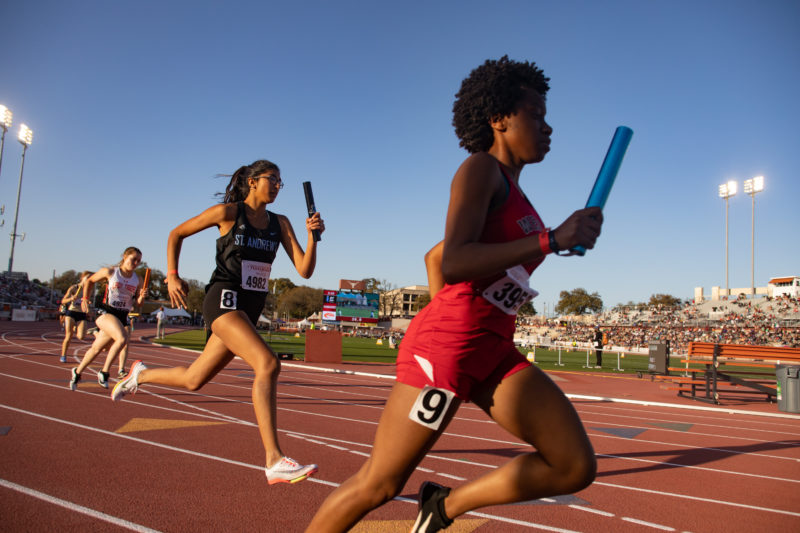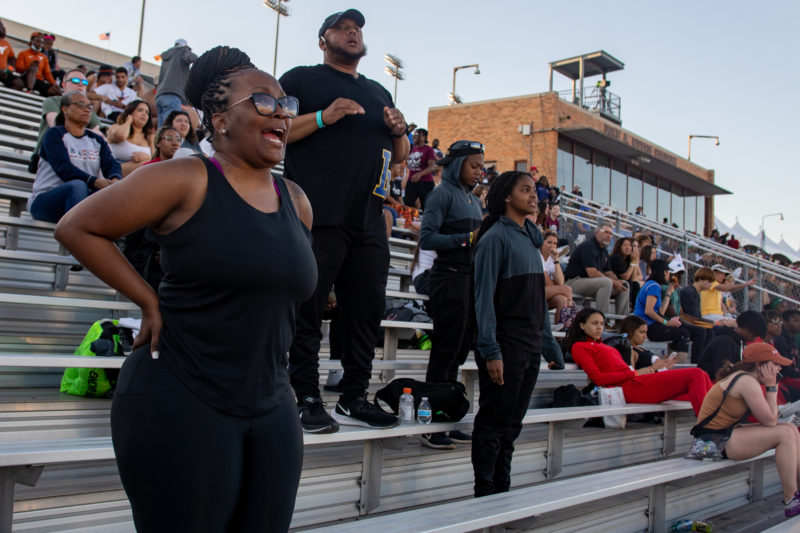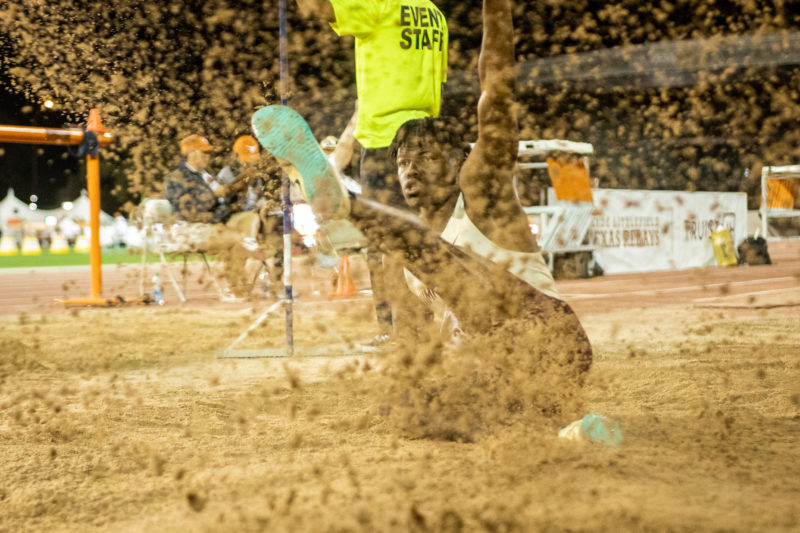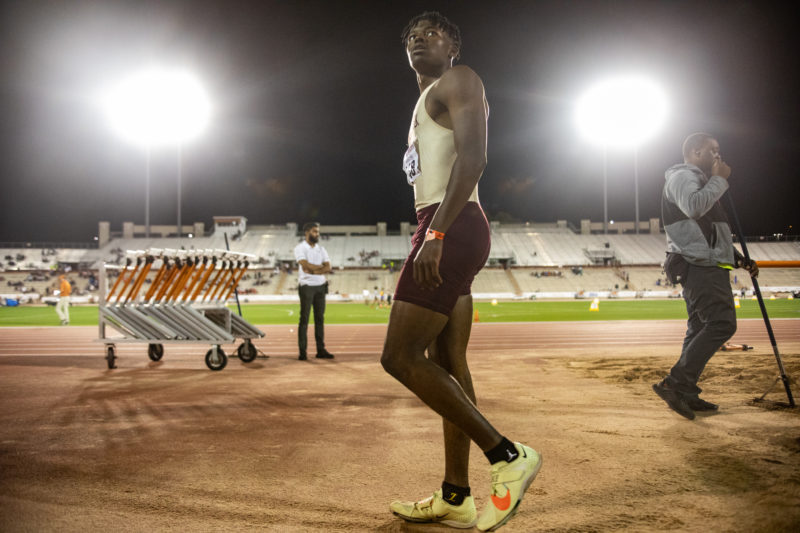Texas Relays, the Largest Predominantly Black Event in Austin, Returns
By Kevin Malcolm Jr.
Reporting Texas

Precious Carter, of Corpus Christi West Oso High School, from right, leads the 4×100 meter relay ahead of Sonia Singh and Brooke Otto during the University of Texas at Austin’s Texas Relays on March 23, 2022. Alyssa Olvera/Reporting Texas
For the first time in three years, more than 5,000 high school, college and professional track athletes and tens of thousands of spectators from around the country came together for the Clyde Littlefield Texas Relays at the University of Texas at Austin the last weekend in March.
The event is billed as the second-biggest track meet in the country (behind the Penn relays) and generates millions in economic activity for Austin. The event has also attracted dozens of accompanying social events and is the largest predominantly Black event in the Austin area.

Shirley Jackson, left, cheers for her high school freshman daughter who made her Texas Relays debut in March. The event has become an important event for Black athletes. Alyssa Olvera/Reporting Texas
The 94-year history of the event has seen performances by such top Olympians as Carl Lewis, Sanya Richards-Ross, Lolo Jones, Michael Johnson, Leo Manzano and Trey Hardee.
“It’s a first-class-ran event and a huge stage and an honor to compete at it,” said Shelton Ervin, track coach at Summer Creek High School and president of the Texas Track & Field Coaches Association.
While many professional athletes come to Austin for the relays, they may be even a bigger deal for high school athletes, Ervin said.
Houston resident Aaron Davis Sr. has attended the Texas Relays the past eight years. The Texas Relays are a place for kids to showcase their skills and get recruited, he said.

Aaron Davis Jr. of Summer Creek High School balances himself after his long jump at the Texas Relays in March. Alyssa Olvera/Reporting Texas
This year Davis was excited to see his son, Aaron Davis II, compete in the 110-meter hurdles and long jump. Davis is a senior at Summer Creek High School and will attend the University of Houston in the fall and compete in track under Lewis, now Houston’s coach. Davis has the best high school long jump in the nation this year, 24 feet 11 inches.
The meet allows athletes to measure themselves against competition from around the country and is fertile recruiting ground for the best college track programs, Davis’ father said.

Texas Relays athletes jump the hurdles during the meet that attracts recruiters for college track programs. Alyssa Olvera/Reporting Texas
Ervin’s high school athletes set records during the relays. The Summer Creek High School 4×400 relay team ran a nation-leading time of 3:09 minutes and set a record at Mike A. Myers Stadium.
During relays weekend, Ervin often takes his team to eat at some of Austin’s iconic restaurants, but not this year. He knew his 4×400 team could set a record and wanted them to stay focused.
“It’s a business trip for us,” he said.
The relays are not only a boom for Austin track fans, but also for area businesses. They generate close to $30 million annually in economic activity, Drew Scheberle of the Greater Austin Chamber of Commerce told KXAN in 2018.
Nelson Linder, Austin NAACP president, said the Texas Relays have been an iconic event for Black Austinites.
“It was a very huge Black and cultural event, black food, Black music, Black people having a good time,” he said. “It was just a celebration for Austin.”
African-American cultural events have sprung up during relays weekend, including the Black Cultural and Health Festival, the Texas Relays Car Show and UT Black Alumni Weekend.
Even though many businesses welcome the thousands of Black relay attendees who flock to Austin, there has been some controversy in past years. During past relay weekends, Austin’s Highland Mall along with prominent Sixth Street clubs closed their doors, citing security concerns and prompting charges of racism.
Highland Mall remained a popular spot for Black attendees of the Texas Relays until it shut down permanently in April 2015. The closure left Black attendees without a central gathering place, Linder said, and the Texas Relays lost a little bit of cachet in the Black community.

Aaron Davis Jr. of Summer Creek High School looks toward the crowd after his long jump at the relays. The track meet has become an important cultural event for Black athletes and Black Austin residents. Alyssa Olvera/Reporting Texas
Linder hopes to change that. He along with the NAACP and other community organizations are looking to revitalize the Travis County Exposition Center to host events during relays weekend close to the Black community in East Austin, helping to bring the event to its former glory, Linder said.
Davis Sr. says that relays weekend is still important for African Americans. “The meaning for the Black community is extra special because it just shows that excellence. If there are other people out there that doubt the Black community, this is a place where you can come dispel that doubt.”
“It’s the best in the world,” Davis said, “It’s the Texas Relays.”